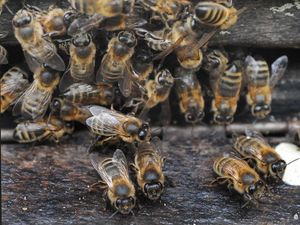Bee-killing pesticides found in West Midlands rivers as activists call for change
Bee-killing pesticides, known as neonicotinoids, have been detected in 85% of tested rivers across England, including key waterways in the West Midlands, according to an analysis of Government figures by environmental groups
Watch more of our videos on ShotsTV.com
and on Freeview 262 or Freely 565
Data from the Environment Agency for 2023-2024 reveals an increase in the presence of these chemicals, up from 79% in the previous testing period of 2020-2022.
Neonicotinoids, which are banned in Europe for their harmful effects on bees’ nervous systems, have been authorized annually for UK use since 2021.
Research shows that these pesticides also endanger aquatic insects like mayflies, potentially disrupting fish and bird populations that rely on them within the food chain.
The River Tame in the West Midlands was among several river sites flagged for high pesticide levels. Other affected rivers include the River Lugg, Sincil Dyke, and the River Nene.
In the East Midlands and East of England, where sugar beet farming dominates, detection rates were particularly high.

This concentration aligns with the government’s consideration to approve neonicotinoid use on sugar beet crops, despite promises to ban these chemicals during the last general election.
Campaigners noted a concerning decline in river monitoring, with only 27 sites tested in 2023-2024, a 37% decrease from 43 sites in 2020-2022.
This reduction reflects the Environment Agency’s strained resources, jeopardising the ability to assess chemical impacts on rivers comprehensively.
During this summer’s election campaign, Prime Minister Sir Keir Starmer said: “The new government will ban neonicotinoid pesticides imidacloprid, clothianidin and thiamethoxam due to their impact on bees.”
But British Sugar and the National Farmers’ Union (NFU) applied to be allowed to use neonicotinoid Cruiser SB on sugar beet, which tackles a plant disease known as virus yellows.
If approved, it will mark the fifth year in a row of emergency use of neonicotinoids.
Richard Benwell, WCL chief executive, said: “The Government must surely deny the request and redouble farming reforms to offer generous support for farmers who cut right down on chemical use.”
“The extensive presence of potent pesticides in rivers is another smoking gun in the hands of intensive agriculture and the decline of nature,” he said.
Barnaby Coupe, senior land use policy manager at the Wildlife Trusts, said: “The UK Government’s pledge to end the emergency use of these bee-killing pesticides must be signed into law.
“Pollinating insects like bees are the foundation of a healthy ecosystem and essential for pollinating crops. These chemicals are banned because they are extremely harmful for soils, water, wildlife and human health.
"The evidence is clear that the environmental risks from neonicotinoids are far too great – there is no place in modern society for them to be used.”
Dr Rob Collins, director of policy and science at the Rivers Trust, said: “The widespread presence of neonicotinoid pesticides in rivers raises alarm bells for the health of our freshwater ecosystems and contributes to the huge cocktail of chemicals afflicting rivers, derived from agriculture, industry, transport and our homes and businesses.
“We need to see greater resources made available to monitor chemicals in the environment and systemic change that delivers a much more sustainable approach to their use, right across society.”
A Defra spokesperson said: “We are committed to tackling all sources of pollution to clean up our rivers, lakes and seas. This government has been clear that we will change existing policies to ban the use of neonicotinoid pesticides that threaten bees and other vital pollinators.”





